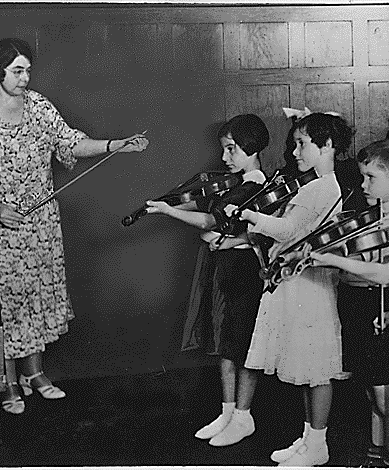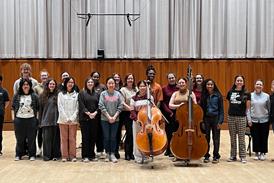Four teachers give their thoughts on helping an errant seven-year-old focus on her lessons

The dilemma I am a novice violin teacher with a seven-year-old pupil who misbehaves in lessons and doesn’t practise. She rolls on the floor in between instructions; she prods her baby brother with the bow; she takes the wire winding off her bow. Every 30-minute lesson includes this kind of behaviour, but she does also listen and play what’s given. Her mother says she enjoys the lessons despite this, and it is true that she does seem to.
I’ve cross-referenced teaching books and tried to structure the lessons imaginatively, but progress is slow. How can I bring more discipline into the lessons (I’m a softie) without putting her off? And should I persevere even though she doesn’t practise?
MIMI ZWEIG
You are a very patient teacher and you probably sense that this seven-year-old is worth your nurturing in the long run. In the short term, I can suggest the following:
*Write a simple contract with the student that describes the parameters of acceptable behaviour and outlines short-term goals
*The reward system works wonders: give her stickers, sweets, ice cream and so on when she behaves
*Have two shorter lessons (10 to 15 minutes) per week instead of a single longer lesson
*Make the lesson a mix of playing the violin, singing, interval recognition, rhythm games, and listening to music
*Ask the parent not to attend the lesson, although you may want to video the lesson for the mother to view at home
Below are the tough suggestions to be used as a last resort:
*Terminate the lesson with the first offence, even if this is only a few minutes into the lesson
*Tell the mother to take the violin back to the shop, or place it out of reach until the child begs for it back
*Have you asked the mother to discipline her child?
Mimi Zweig is professor of violin at the Jacobs School of Music and director of the Indiana University String Academy in Bloomington, US
MARK BJORK
Since progress is being made and the student reportedly is enjoying the experience, I think you can improve this situation. First, if at all possible, pair this student with another one, about the same age or a bit older, who is a fine example of good behaviour. Then have them watch each other’s lessons. The problem student will see what is expected when you praise the other for good work and behaviour. This student will also be less likely to misbehave when watched by a peer.
Most importantly, don’t respond to the bad behaviour. Say nothing and show nothing in your facial expressions – simply wait. The child will eventually notice that you are not responding. You can then say something like, ‘All right, are you ready to work?’ For the student, receiving attention for bad behaviour can be a reward in itself: children often learn this manipulation early. The idea is to turn the situation around so that the child is rewarded only for good behaviour.
If all else fails, put down your instrument and walk out of the room – but say nothing to the child or to the parent. Stay out of the room for perhaps three to five minutes or until you hear nothing, then return. Offer no explanation (very important) to the child or parent but say again, ‘Are you ready to work?’ Final advice: never bargain with a student.
Mark Bjork is professor of violin and pedagogy at the University of Minnesota School of Music in Minneapolis, US
CAROLINE LUMSDEN
First, the positives. You have a pupil who is achieving and enjoys her lessons, so you are doing all the right things.
I find that making the child the teacher, by giving them the freedom to choose the order of the lesson, helps a lot. Praise and encourage them at all times, and just ignore the bad behaviour. Change tack frequently, but have something that she can perform to her mother at the end of the lesson.
One student of mine insisted on pretending to be a dog on all fours throughout a term’s beginner group sessions, and would only answer to the name of her favourite Disney princess. Her mother sat in on these lessons and despaired, but she told me the child didn’t stop playing her violin at home. A term later I took her for ten minutes a week, initially without her mother, and I found she was really bright musically and ready to go. We still had discipline issues and I employed all of the above tactics.
A year later, the same six-year-old has passed her first exam with distinction, playing one of her own compositions as well. Her behaviour has improved dramatically and she is playing in a string ensemble, still with a little cheekiness which I love because I now know that she will go far.
If you can reconcile your pupil’s cheekiness with her diligence you will succeed, and once you have got your pupil on side, you can gradually give each lesson a structured framework that includes sightreading duets, singing and playing, fun scales, and improvisation and composition – a great way to learn theory. I admire your tenacity.
Caroline Lumsden divides her time teacher training, creating new editions and starting new music centres for 3–18-year-olds based on her Musicland Approach.
MIKE NELSON
You seem to have made good progress with this child, and as long as she is enjoying the lessons, don’t worry too much about her not practising – in my experience, children of this age rarely practise effectively. I am sure that the misbehaviour will disappear in time, especially if you can capture her attention by finding music that she really wants to play.
I find that playing duets together, which can be treated as a reward at the end of the lesson, greatly increases motivation. It is good to see that you already try to choose pieces to suit her.
Try cutting the lessons down to 20 minutes – ideal for the average seven-year-old. Fill them with non-stop action. Could her mother perhaps leave the baby with someone for the duration of the lesson? You might find that these steps help the diligence factor and consequently lift your confidence. Each lesson should include encouragement and positive verbal rewards for things that have improved.
I have always tried to imagine my pupils continuing to play when they are adults. So many players who are not professional musicians gain relaxation and joy from playing quartets and in amateur orchestras. Sometimes it helps to remember that children will grow up and almost inevitably improve. If something is wrong, avoid saying ‘no’ but work at the problem with the pupil until it starts to improve, and make sure the pupil knows that the improvement is because of well-thought-out practice. Exams should be treated as a tool rather than as the whole basis of learning – I would rather see them used as a confidence-builder (with a good mark), or as a practice-builder for teenagers (who need to work). Outside factors such as a baby sibling can make the lessons difficult for the teacher – don’t take the blame for what is beyond your control.
Mike Nelson has been a regular strand leader on the Stringwise workshops in London, UK, and is joint musical director of the Pharos Guild summer music course
This article was originally published in the September 2014 issue.











































No comments yet